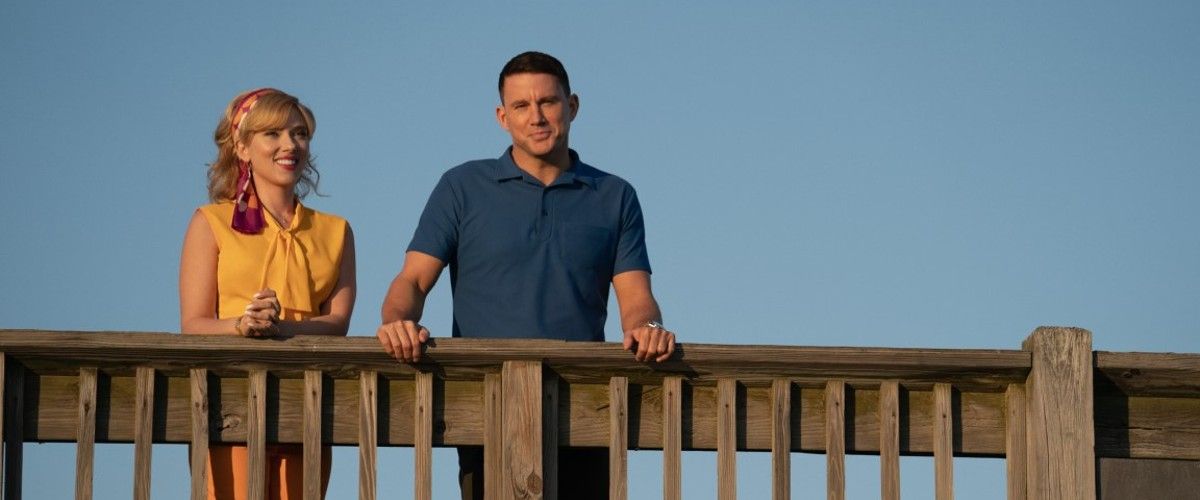Jonah Naplan July 11, 2024
At once a clunky rom-com inside a historical fiction piece and a political satire, “Fly Me to the Moon” struggles to find its footing in most of its endeavors. It’s got two incredibly charismatic leads but a story that doesn’t know what to do with either one of them, often misplacing their charm for a more thematically appealing idea. Director Greg Berlanti (“Love, Simon,” “Life as We Know It”) appears to be far more interested in the physical concept of a romantic dynamic than in actually fleshing one out for the purposes of our attachment to these characters. The world of “Fly Me to the Moon” is already so transactional—at times it’s difficult to tell what’s real and what’s fake—that it would certainly be nice to have at least one grounded element to grab hold of. But the movie rarely provides us one, despite the talents of Channing Tatum and Scarlett Johansson who are both trying so hard to keep our attention. Their stilted efforts, however, never take flight.
The movie is set in Florida in 1969. Johansson plays an ad executive named Kelly Jones who’s particularly good at selling products through outrageous campaign strategies. Her newest assignment: “selling” NASA’s Space Program to the common man before the Apollo 11 is to shoot off into space with three astronauts onboard in seven months. Employing brands such as Omega, Fruit of the Loom, and Rice Krispies to appear on various posters and television advertisements to promote the cause, she’s ridiculed by former-astronaut-turned-pilot/flight coordinator Cole Davis (Tatum), who believes his no-nonsense, all-business attitude is the best (and only) mindset for getting a man on the moon before the Soviets. The two first meet cute at a diner one night, with Kelly accidentally lighting herself on fire, and Cole spilling and confessing on the spot that she’s the most beautiful woman he’s ever come across. There won’t be another moment this charming again, even as Kelly and Cole continue to banter throughout the rest of this overlong runtime upon learning, to their dismay, that they’ll be working together on the space project. Soon, it takes a turn, with the arrival of White House official Moe Berkus (Woody Harrelson), who proposes Project Artemis, the making of a fake moon landing movie to broadcast on television in place of the real thing, lest something goes wrong, and the Americans are at risk of looking foolish in front of the entire world.
So in come the filmmakers. Part of the missed potential of “Fly Me to the Moon” is that it never becomes nearly smart nor funny enough to truly satirize the nature of making movies, despite all the perfect pieces it already has set up. What’s more outlandish than making a big budget movie completely undercover, because if its production is leaked to the public, it could completely destroy NASA and embarrass the entire country? A better film could have found more intriguing routes to explore that novelty, while this movie only offers up the occasional sliver of what could have been. Comic actor Jim Rash plays the director of the fake movie Lance Vespertine, and he seems to be the only guy onscreen that knows what kind of picture he’s acting in, taking obvious cues from Christopher Guest and such throughout. The contrast between the highly classified, super-serious movie that they’re making, and what Lance wants to do to glamorize it is comedy left mostly untouched.
Other supporting players like Ray Romano as Henry Smalls and a duo of young, talented engineers played by Donald Elise Watkins and Noah Robbins try their best to elevate this material above merely belabored tropes that define “Fly Me to the Moon” as just another space movie with a semi-unique center, but they’re fighting against a screenplay by Rose Gilroy that wants to cram all of its characters and ideas into little boxes that affix each one with a singular means of expressing itself physically, and never in a way that we’ll particularly remember. With this, each element ends up playing more like a tired archetype than a necessary piece, removing most of the intrigue from the story within the story (obviously, we all already know the moon landing was a success), somehow managing to rely on clichés even though the narrative is so inherently interesting.
It’s fascinating that the last portion of the movie, the launch of Apollo 11 itself and everything that went down that day, is its strongest part, especially considering that it’s something we’re already so familiar with. And yet, the movie continues to drone on and on much after it could have found a natural conclusion, stretching its legs way beyond two hours in an extension that feels like forever. The most unfortunate piece of all is that the messy enemies-to-lovers romance at its center—the largest point of appeal for most moviegoers—only matches the movie’s chaotic nature, presenting us two fine actors who are both good individually, but have very little chemistry when put together. What could have been a cute little “love against turmoil” dramedy with hints of political and cultural satire reverts into a merely forgettable mishmash of ideas and missed opportunities with bold ambitions that remain frustratingly earthbound.
Now playing in theaters.

